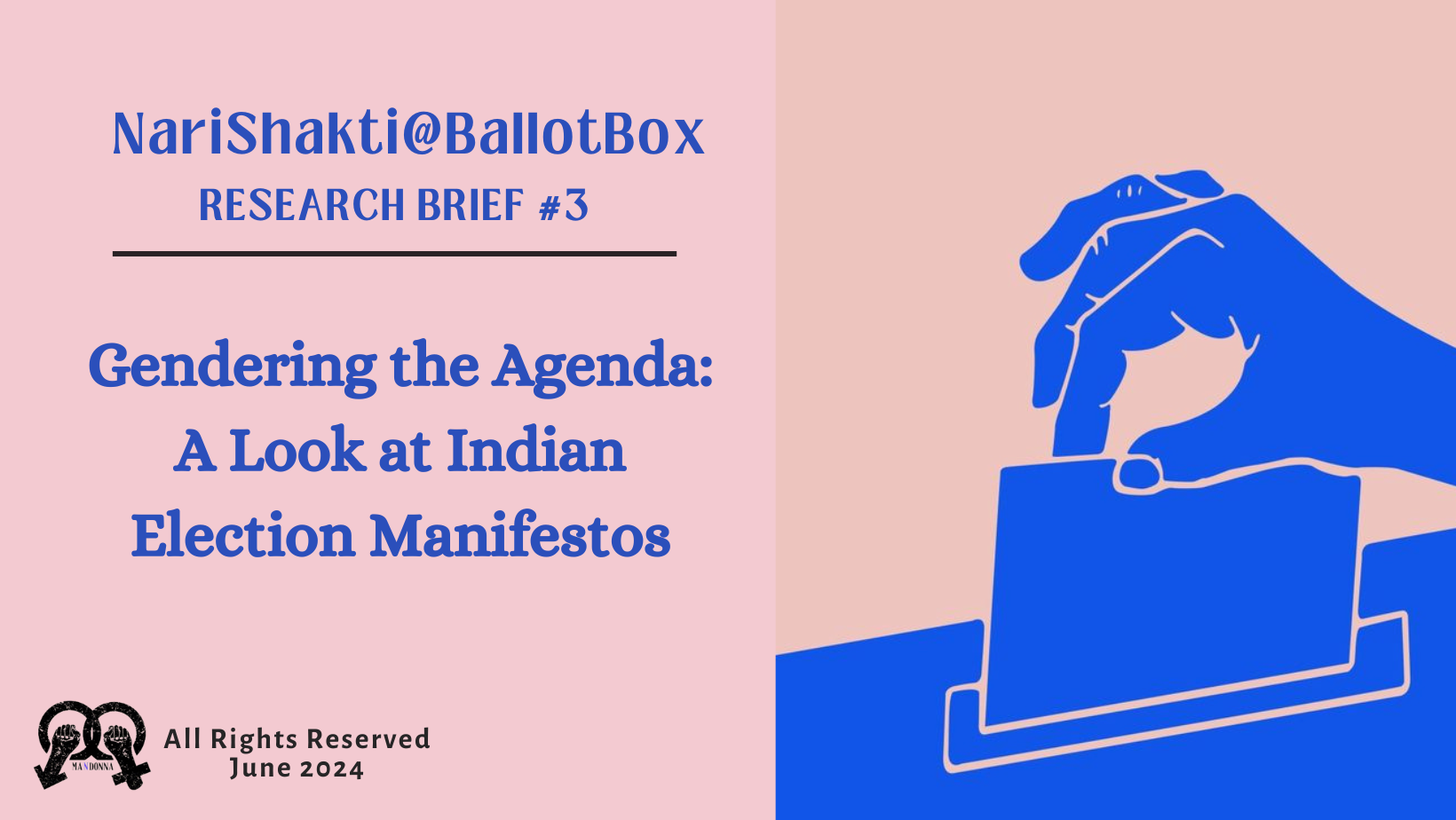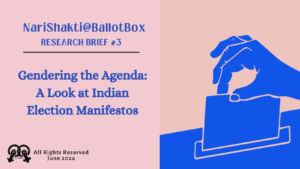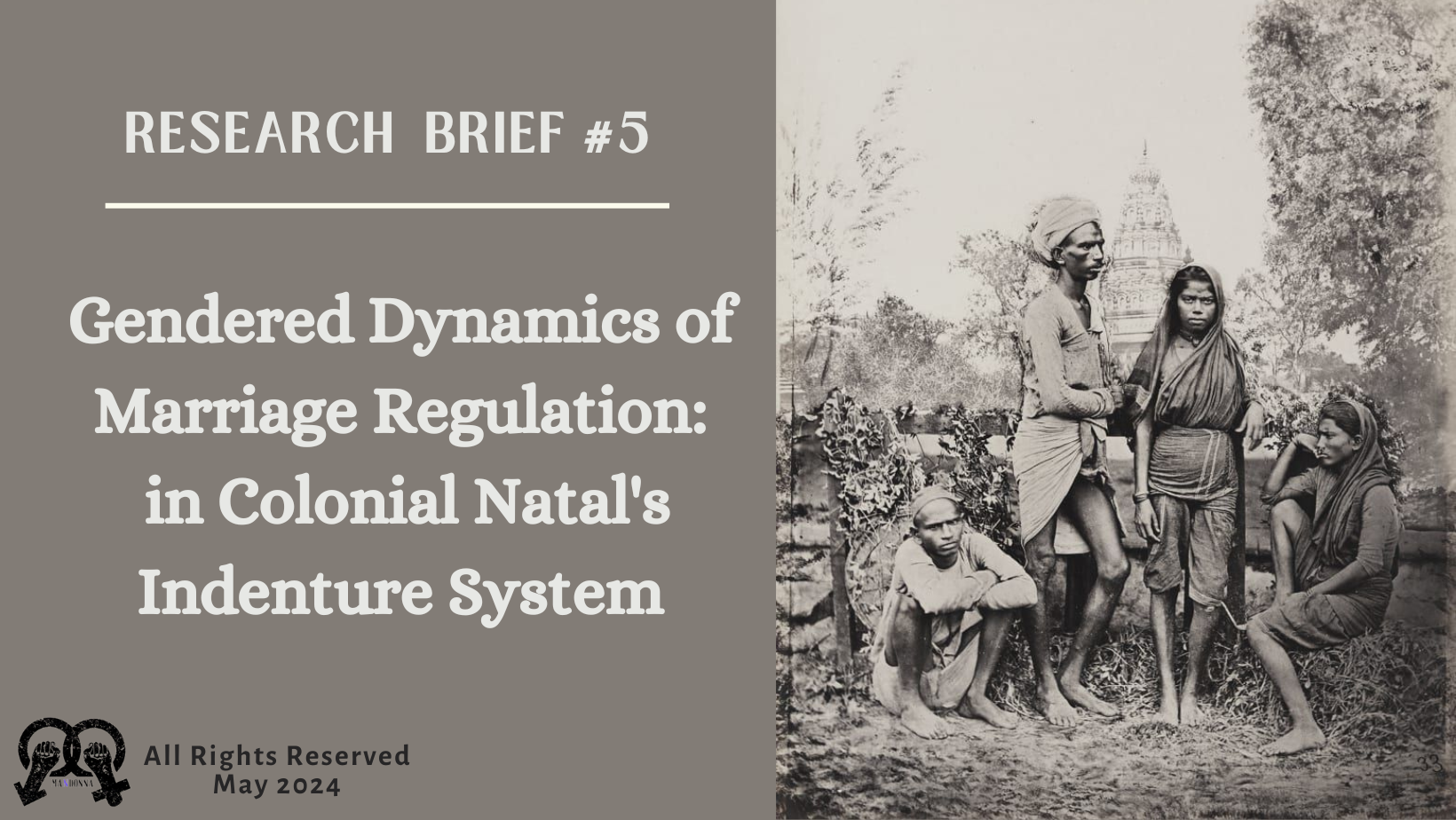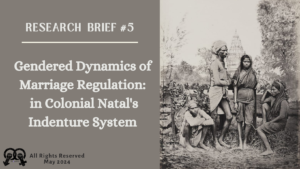

This research focuses on analysing gender issues within Indian political party manifestos, specifically examining the reinforcement of traditional gender roles, challenges to women’s empowerment, and the pursuit of gender equality. By studying the manifestos, the research aims to uncover trends, inconsistencies, and areas for improvement in addressing women’s issues, tracking policy evolution, and assessing the impact of these changes on women’s empowerment. The study seeks to address underrepresentation, evaluate policy effectiveness and understand community impacts, highlighting the need for gender-sensitive policies, inclusivity and the challenge of traditional norms to advance women’s rights and achieve genuine gender equality in the Indian political landscape.
The analysis reveals a concerning trend of manifestos framing women’s issues within the domestic sphere, perpetuating patriarchal notions and hindering progress towards gender equality. Despite recent policy initiatives addressing gender-based violence, reproductive health, political representation and migrant women’s rights, a persistent lack of gender inclusivity remains. The research emphasises the importance of comprehensive and transformative approaches, including challenging traditional gender norms, prioritising systemic reforms and promoting women’s active participation in politics, as essential steps towards achieving true gender parity in India.
NariShakti@BallotBox is a unique series 3 of Research Briefs published by Mandonna Research Consultants on the key issues and challenges surrounding women and their participation in the Indian General Elections 2024.
India has been gloriously distinguished as the largest democracy in the world. With around 96 crore eligible voters set to decide the trajectory of our nation, it is crucial to acknowledge that the historic gap between male and female voters has significantly decreased over the years. An SBI Research Report (2024) has indicated that the number of female voters is on the rise and will reach the inflexion point by 2029. Projected trends indicate that by 2047, women may outnumber men as voters by 10% (SBI, 2024).
Women’s participation in elections, either as voters or poll contestants, is crucial for the sustainable and equitable development of the country and for achieving transformational economic and social changes. However, women continue to be marginalised in election activities, ranging from campaigns to popular perception and from representation to party manifestos.
To this end, the NariShakti@BallotBox series would aim to highlight some of the key aspects and issues at the intersection of the Lok Sabha elections of 2024 and women’s issues. We envision empowering key stakeholders through data-backed research and analysis for further action.
to read more, click “access me”
Manya Manra is a 2nd-year Psychology student at Lady Shri Ram College for Women and a Research Intern at Mandonna.
Sneha Kumari is a 2nd-year Political Science student at Lady Shri Ram College for Women and a Research Intern at Mandonna.
Falguni Mahajan is a Political Science graduate from Lady Shri Ram College for Women and the Founder-CEO of Mandonna.


This paper embarks on a crucial exploration to address a critical, yet largely overlooked question regarding the involvement of women in formal electoral politics in India and its potential correlation with the evolution of a more gender-sensitive political landscape. Compounded by biases of inadequacy and electability entrenched within predominantly male-dominated party structures, female political leaders often find themselves relegated to the periphery, unable to advocate effectively for gender inclusivity within their own parties. This research underscores that simply augmenting the presence of women in formal electoral politics does not guarantee the integration of women’s issues into party agendas. Rather, it emphasizes the pivotal role played by the effectiveness of women’s participation as both voters and candidates, as well as their representation as Members of Parliament (MPs), in shaping party priorities. The research underscores a pressing need for whistle-blowers from all segments of society to spotlight and address the structural and institutional deficiencies that hinder genuine representation and the creation of a gender-sensitive political space for women within the electoral sphere.
NariShakti@BallotBox is a unique series 3 of Research Briefs published by Mandonna Research Consultants on the key issues and challenges surrounding women and their participation in the Indian General Elections 2024.
India has been gloriously distinguished as the largest democracy in the world. With around 96 crore eligible voters set to decide the trajectory of our nation, it is crucial to acknowledge that the historic gap between male and female voters has significantly decreased over the years. An SBI Research Report (2024) has indicated that the number of female voters is on the rise and will reach the inflexion point by 2029. Projected trends indicate that by 2047, women may outnumber men as voters by 10% (SBI, 2024).
Women’s participation in elections, either as voters or poll contestants, is crucial for the sustainable and equitable development of the country and for achieving transformational economic and social changes. However, women continue to be marginalised in election activities, ranging from campaigns to popular perception and from representation to party manifestos.
To this end, the NariShakti@BallotBox series would aim to highlight some of the key aspects and issues at the intersection of the Lok Sabha elections of 2024 and women’s issues. We envision empowering key stakeholders through data-backed research and analysis for further action.
TO READ MORE, CLICK “ACCESS ME”
Ananya Jaggi is a 1st-year Economics student at Miranda House and a Research Intern at Mandonna.
Sara Thind is a 2nd-year Political Science student at Lady Shri Ram College for Women and a Research Intern at Mandonna.
Falguni Mahajan is a Political Science graduate from Lady Shri Ram College for Women and the Founder-CEO of Mandonna


Media coverage of women candidates is crucial in shaping voter perceptions and influencing electoral outcomes. The following paper seeks to analyse the media coverage of the 2024 Lok Sabha general elections through a gender lens, focussing on the visibility and framing of women candidates. Through a comprehensive content analysis of electoral coverage by the press, broadcasting, and online news media sources, the paper unearths a systematic gender bias and sexist narratives underlying the electoral airtime. In pursuit of substantive gender justice and democratic participation, the paper concludes with a call for gender-neutral election coverage practices and the fostering of feminist media literacy among voters.
NariShakti@BallotBox is a unique series 3 of Research Briefs published by Mandonna Research Consultants on the key issues and challenges surrounding women and their participation in the Indian General Elections 2024.
India has been gloriously distinguished as the largest democracy in the world. With around 96 crore eligible voters set to decide the trajectory of our nation, it is crucial to acknowledge that the historic gap between male and female voters has significantly decreased over the years. An SBI Research Report (2024) has indicated that the number of female voters is on the rise and will reach the inflexion point by 2029. Projected trends indicate that by 2047, women may outnumber men as voters by 10% (SBI, 2024).
Women’s participation in elections, either as voters or poll contestants, is crucial for the sustainable and equitable development of the country and achieving transformational economic and social changes. However, women continue to be marginalised in election activities, ranging from campaigns to popular perception and from representation to party manifestos.
To this end, the NariShakti@BallotBox series would aim to highlight some of the key aspects and issues at the intersection of the Lok Sabha elections of 2024 and women’s issues. We envision empowering key stakeholders through data-backed research and analysis for further action.
to read further, click “access me”
Sanika Singh is a 2nd-year Political Science student at Miranda House and a Research Intern at Mandonna.
Falguni Mahajan is a Political Science graduate from Lady Shri Ram College for Women and the Founder-CEO of Mandonna.


Yatra Naryastu Pujyante Ramante Tatra Devta, Yatraitaastu Na Pujyante Savaastatrafalaah Kriyaah
“Where Women are honoured, divinity blossoms there, and wherever women are dishonoured, all action no matter how noble it may be, remains unfruitful.”
- Manusrmiti chapter 3, Mantra 56
The current research paper focuses on the question of marital rape and its impact on the Indian society as an attempt to understand the sociological, psychological, economic and legal reasons behind the non-criminalisation of marital rape. The paper aims to evaluate the possibility of a policy criminalising marital rape in the country, with an acknowledgement and technical understanding of the problems of enacting such a policy. The cultural and social background of marital rape in India, along with the relationship between marriage and sex have to be understood to truly grasp the gravity of marital rape and its psychological impact on women. The paper also attempts to collate various sources that contribute to the understanding of a woman and her bodily rights in order to furnish a more holistic view of marital rape, which draws from several disciplines.
t0 read further click”access me”
Vandya Bisaria is a third-year Psychology student at Lady Shri Ram College for Women and a Research Intern at Mandonna
Charu Pawar is a third-year Political Science student at Lady Shri Ram College for Women and the Head of Research at Mandonna


This paper explores the gendered dynamics of marriage regulation within the British colonial context of Natal’s indentured system, focusing on the period from the 1860s to 1891. The paper aims to examine the complex interplay of colonial governance, societal perceptions, and gender roles in shaping marriage practices among Indian indentured labourers. Initially marked by a reluctance to interfere in Indian customs, colonial policies gradually shifted towards interventionist policies, culminating in the enactment of Law 25 of 1891. This legislation aimed to regulate Indian marriages under civil law, ostensibly to improve moral standards and align familial structures with settler norms. However, the legislative journey reflects a deeply gendered approach, perpetuating patriarchal control and inequalities within Indian communities. While ostensibly offering avenues for women to escape abusive marriages, such interventions often reinforced existing power dynamics and marginalised women’s agency. This paper aims to analyse the complexities of colonial governance, cultural autonomy, and gender dynamics inherent in the regulation of Indian marriages in Natal’s indenture system.
Vidarshna Mehrotra is a third-year History student at Lady Shri Ram College for Women and a Research Intern at Mandonna
Madhulina Sonowal is a third-year Political Science student at Lady Shri Ram College for Women and the Editor-in-Chief at Mandonna


The perception of pain varies between men and women, encompassing differences in expression, coping strategies, and treatment responses. Biological factors, including genetics and hormones, play pivotal roles in sex-specific pain mediation, influencing women’s pain responses across different life stages. Menstrual cycles, pregnancy, and oral contraceptive use further highlight the impact of hormones on pain experience. Psychosocial factors, rooted in gender norms, contribute to disparities in pain reporting. From an early age, societal expectations shape how individuals, based on their gender, express and tolerate pain. Healthcare providers often carry these biases into clinical settings, where studies reveal tendencies to perceive women as more likely to exaggerate pain and less likely to receive aggressive treatment. These biases extend to treatment recommendations, with male patients receiving less psychosocial assessment and women being less likely to obtain aggressive analgesic treatment. Addressing these gender-related expectations is crucial in mitigating medical biases, ensuring equitable pain assessment, and promoting tailored pain management strategies. Hence The primary objective of this research is to assess how these differences in pain perception lead to biases in a clinical setting catering to misdiagnosis or sheer medical neglect and to suggest policies and strategies to remedy the same. This is going to be done through an analysis and review of literature and studies pertaining to this area of study. This will be done by inspecting and analyzing studies conducted over the past decade.
Aim: To suggest remedies to battle gender-related biases within clinical settings that stem from gendered differences in pain perception
Riddhi Tiwari is a TYBA student at Sophia College (Autonomous) studying Psychology
Charu Pawar is a 3rd-year student at Lady Shri Ram College, studying Political Science
Falguni Mahajan is a Political Science graduate from Lady Shri Ram College and the Founder of Mandonna
TO READ FURTHER, CLICK “ACCESS ME”


Abortion occupies a central space in the feminist discourse, especially since the ’60s and the ’70s. It was the 2nd wave of feminism (aka Radical Feminism) when the ‘chattel’ status of women, as a class, was being challenged. In the contemporary era, abortion has emerged as a contentious issue for feminists, especially with the overturning of the landmark Roe v Wade case in the USA. This has intensified with the differing perspectives on and interpretations of abortion as an issue.
As conservative forces align, both institutionally and socially, to deny pregnant persons their bodily autonomy and reproductive rights, access to safe abortion is becoming increasingly distant for child-bearers across the gender spectrum. For those in society who are more at risk, such as adolescents, tribal women, LGBTQIA+ community, etc. these hurdles grow more severe. This is reflected well in the fact that despite the liberal abortion policies of India, approximately 67% of the total abortions are unsafe here (UNFPA, 2022).
While each individual is entitled to their own beliefs and values around abortion as an issue, messages about abortion must be factual and supportive of individual choices. To this end, Mandonna is proud to release its maiden guidebook on Safe Abortion. As an organisation dedicated to mainstreaming the gender discourse, we hope this guidebook is a vital educational resource for people with child-bearing capabilities across the gender spectrum. In our quest to guide people from all backgrounds on the path to accessing safe abortion aids, we have compiled ways to execute the
safest abortion practices.
We hope this Guidebook helps you! Happy Reading!!
Charu Pawar is a 3rd-year Political Science student at Lady Shri Ram College for Women and the Research Head at Mandonna
Debastuti Talukdar is a 3rd-year Political Science student of
Deshbandhu College and the Content Head at Mandonna
Mahera Imam is a PhD scholar at Pondicherry University and a
Research Intern at Mandonna
TO READ FURTHER CLICK ACCESS ME


The beauty industry, traditionally associated with femininity, has played a significant role in shaping societal perceptions of gender roles and norms. Cosmetic shops, as integral components of this industry, has served as both a reflection and a reinforcement of entrenched gender norms and societal expectations. However, in recent years, there has been a noticeable shift in the gender composition of the cosmetic retail sector with more men entering this traditionally female-dominated field. While this transformation initially appears to challenge the prescribed gender performances and underscore the evolving gender dynamics in the workspaces, it is crucial to recognize the overarching influence of the neoliberal capitalist economy in driving and shaping this paradigm shift.
Keeping such changing trends as the central concern, this research project aims to conduct an analysis of the experiences and motivations of male employees in cosmetic stores to highlight the shift in gender representation and its effects on altering perceptions of beauty, femininity and masculinity. It analyses whether the introduction of men into roles traditionally held by women marks a social transformation or if it merely serves as a strategic response to market demands and profitability considerations within the neoliberal capitalist framework. Thus, the paper aims at highlighting the complex interplay between social change, market and gender.
Madhulina Sonowal is a 3rd-year student at Lady Shri Ram College for Women, studying Political Science.
TO READ FURTHER CLICK “ACCESS ME”



According to the AISHE Report 2020–21, the share of women in STEM-related jobs is 14%. While women constitute 43% of STEM enrollments in education, this number drops significantly to 3% in science Ph.D. programs and 6% in engineering and technology Ph.D. programs. This study delves into the influence of socio-structural factors on women’s participation in business leadership within science and technology. Focusing on entrepreneurship and STEM fields, particularly regarding women, it examines how societal perceptions and structural barriers impede women’s career choices.
This paper concludes by analyzing the various schemes and opportunities that are made available by the government to transcend structural restraints and further suggesting changes to make them more relevant or effective according to prevalent needs.
To read this report, kindly click “Access Me”
Restricted.. You can access Research Report once every 24 hours.
